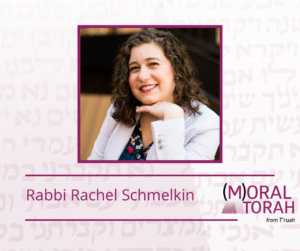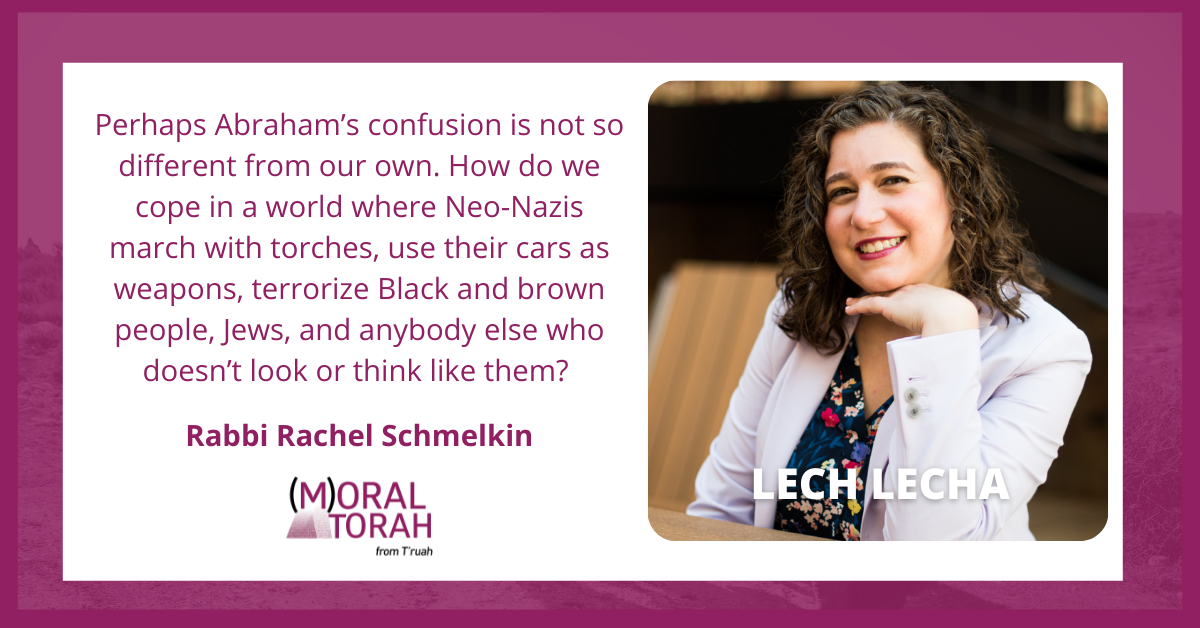A D’var Torah for Parshat Lech Lecha by Rabbi Rachel Schmelkin
“It’s time to torch those Jewish monsters. Let’s go. 3pm.”
On August 12, 2017 in Charlottesville, Virginia, I stared at the screenshot in horror, witnessing a direct threat to the Jewish community. Hundreds of Neo-Nazis and white supremacists had marched carrying torches the night before. The morning rally had been disbanded by police, a state of emergency declared, but now hundreds of dangerous people were on the loose. I warned my congregants not to go near the synagogue. Charlottesville was in total chaos, at risk of being consumed by flames. I knew the world could be a tumultuous place, but never before had I felt it so acutely.
In a midrash on this week’s Torah portion, Lech Lecha, Abraham grapples with the state of the world. Bereshit Rabbah 39:1 says:
“The ETERNAL said to Abram: Leave your land, your birthplace and your father’s house…” The midrash questions, to what may this be compared? To a man who was travelling from place to place when he saw a palace in flames. He wondered, “Is it possible that the palace lacks an owner?” The owner of the palace looked out and said, “I am the owner of the palace.” So Abraham our father said, “Is it possible that the world lacks a ruler?” The Holy Blessed One looked out and said to him, “I am the ruler, the Sovereign of the universe.”
Rabbi Jonathan Sacks explains in A Letter in the Scroll that, in this midrash, Abraham sees both the order of the world — that God is indeed the Ruler — and the disorder of the world — the world is in flames — and Abraham struggles to understand how a world with a creator could still contain such raging fires.
Sign up to receive (M)oral Torah in your inbox each week.
Perhaps Abraham’s confusion is not so different from our own. How do we cope in a world where Neo-Nazis march with torches, use their cars as weapons, terrorize Black and brown people, Jews, and anybody else who doesn’t look or think like them? How do we face the numerous other tragedies that plague our world? Rabbi Sacks writes:
If…I have interpreted the midrash correctly, then Judaism begins not in wonder that the world is, but in protest that the world is not as it ought to be. It is in that cry, that sacred discontent, that Abraham’s journey begins. At the heart of reality is a contradiction between order and chaos… There is no resolution to this conflict at the level of thought. It can be resolved only at the level of action, only by making the world other than it is. (A Letter in the Scroll, p. 57)
The summer of 2017 in Charlottesville and its aftermath is more than a story of trauma, pain, and victimhood. It is also a story of human goodness, bravery, resilience, and justice. It’s a story of people witnessing extreme hate and choosing to do something about it. Many gave endless hours of their time and risked their physical safety during the weekend of the rally and for months afterwards to protect the marginalized and to speak out in favor of dignity and love. As a result of a community-wide reckoning and a democratic process, the racist Confederate statues that were prominently placed during Jim Crow have been taken down.
And now we are just days away from the October 25 Sines vs Kessler trial, a civil lawsuit brought forward by Integrity First for America and their pro-bono legal team on behalf of nine courageous plaintiffs. This suit aims to hold the leaders of the violence and their hate groups accountable for the violence from that weekend. Their team has worked tirelessly to secure justice for the plaintiffs and, by extension, all of us.
Find more commentaries on Lech Lecha.
They have already made great strides in proving that those who rallied in Charlottesville came with an intent to do harm, and if they win (and I believe they will), this lawsuit will bankrupt the perpetrators of hate and violence and make clear to any other groups or individuals who might want to carry out a similar attack that there will be a hefty price to pay. It will send a clear message: Good people will come forward and douse Nazi torches so that they cannot ignite even the smallest flame.
We know the work ahead will be long and hard. We have accomplished much, and celebrated our successes, but we must remember, the palace is still in flames. At times we may feel that the sorrow of the world is too much to bear, but all hope is not lost. As poet Merle Feld writes, “the only hope is shoulder to shoulder.” (Finding Words, “Not yet 75, Ruth,” Behrman House). If we go forth together and each do our part,  we can endure the pain and remind each other that we have the power to create a better tomorrow.
we can endure the pain and remind each other that we have the power to create a better tomorrow.
Rabbi Rachel Schmelkin is the Senior Manager for Jewish Programs at the One America Movement. She also serves as a rabbinic fellow at Temple Micah in Washington D.C. Rabbi Schmelkin served as associate rabbi at Congregation Beth Israel in Charlottesville, VA from 2016-2020.
As the trial approaches, you can help support Integrity First for America’s work by clicking on one of these toolkits:

